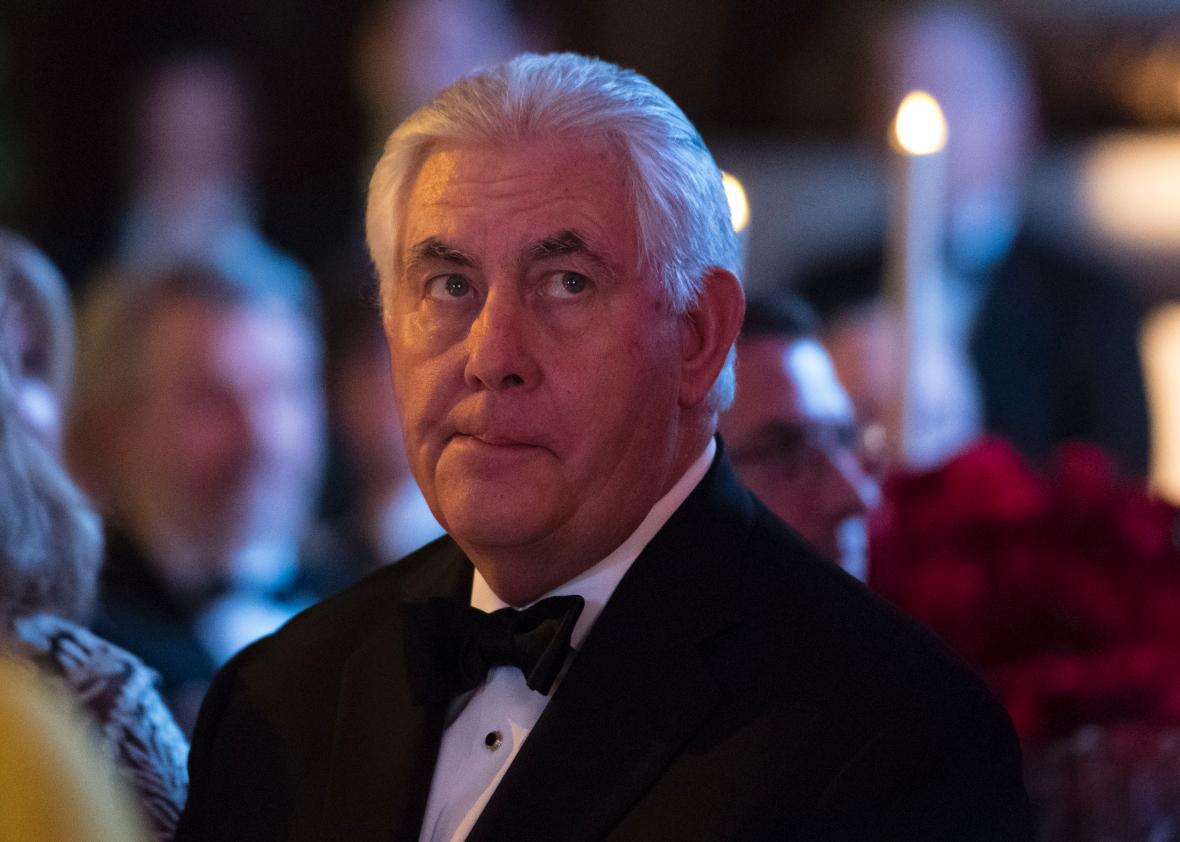It’s now looking like the brief show of GOP resistance to the nomination of Rex Tillerson for secretary of state was just that, a show. The senate’s leading Russia hawks—John McCain, Lindsey Graham, and Marco Rubio—now say they’re reassured enough to support the former Exxon CEO, all but ensuring his confirmation.
In the end, and like the rest of Donald Trump’s nominees for national security and foreign policy Cabinet positions, Tillerson expressed fairly mainstream foreign policy views. In fact, one of the most striking things about the confirmation hearings of the past two weeks was hearing one nominee after another—Tillerson, John Kelly, James Mattis, Nikki Haley—reject the extremist positions that had been at the very center of Trump’s campaign. They could have been applying for jobs in a Marco Rubio or Jeb Bush administration. All rejected creating a registry of Muslim citizens, barring Muslims from entering the United States, resuming the use of waterboarding and other forms of torture, dismantling NATO, or encouraging more countries to develop nuclear weapons. They were wary of the intentions of Vladimir Putin’s Russia and mostly accepted the intelligence community’s findings on election interference. They felt a big beautiful wall was not the best method of addressing immigration. They wanted to make sure the Iran deal was strictly enforced rather than tearing it up completely. Even CIA director nominee Mike Pompeo seemed to be backing away from his past views on torture and “radical Islam” during his hearings. The strange vice presidential debate, back in October, in which Mike Pence didn’t feel it necessary to defend or even acknowledge Trump’s views, turns out to have been the blueprint for how members of this administration will talk about the boss.
Some have argued that Trump’s relatively standard-issue Republican Cabinet picks could moderate his more extreme views and rash impulses. This was actually the subtext of much of the hearings. “We can only hope,” the president listens to Mattis, Sen. John McCain suggested during the general’s hearing. At Haley’s hearing, she reassured the Senate Foreign Relations Committee about Trump’s views on NATO and other international alliances:
I think that what the president-elect has put out there are his opinions as they stand now. What I do think is going to happen is that I look forward to communicating to him how I feel as I do, and I know that the rest of the National Security Council does as well. … As we continue to talk to him about alliances and how they can be helpful and strategic in the ways we are moving forward, I hope that we can get him to see it way we see it.
In other words, we can rein him in.
I wouldn’t be so sure. Yes, Trump is convincible. The fact that “Mad Dog” Mattis opposes torture seems to have impressed him, for now at least. But convincing Trump means gaining access to him, and even under normal circumstances that can be tricky. Barack Obama, for instance, was criticized during his second administration for relying heavily on the counsel of a small group of advisers who had been with him since his 2008 campaign, whereas Secretary of State John Kerry was memorably described by one White House official as floating through space like Sandra Bullock in Gravity.
Trump doesn’t exactly seem like someone who seeks out the widest variety of opinions and expertise before making a decision. During the campaign, he notably chose not to take State Department briefings before speaking with foreign leaders or the customary daily intelligence briefings available to the president-elect. Last week, the Washington Post’s Josh Rogin reported that so far, key national security decisions are being mostly handled by chief strategist Steve Bannon, senior adviser and son-in-law Jared Kushner, and chief of staff Reince Priebus. These three “comprise an informal council that sits atop the Trump transition team’s executive committee and has the final say on national security personnel appointments. No major decision can go forward without their sign-off,” Rogin writes. National Security Adviser Michael Flynn also reportedly plays an influential role.
Even if that circle expands a bit now, these figures who, with the exception of Priebus, were loyal to Trump throughout the campaign, seem far more likely to exert influence over him and have access to him than his Cabinet. Flynn and Bannon, at least, are much closer to the views Trump espoused during the campaign. (Kushner is a bit of a cipher at this point, but if he was as key as some think to getting Trump elected, he cannot be viewed as a moderating force.)
The confirmation hearings allowed former Trump opponents in the Senate GOP to act like they were exercising oversight and reassure themselves that all that crazy stuff from the campaign was just talk, but no one should be reassured of anything just yet. The names in Trump’s Cabinet will matter less than who he really listens to.
